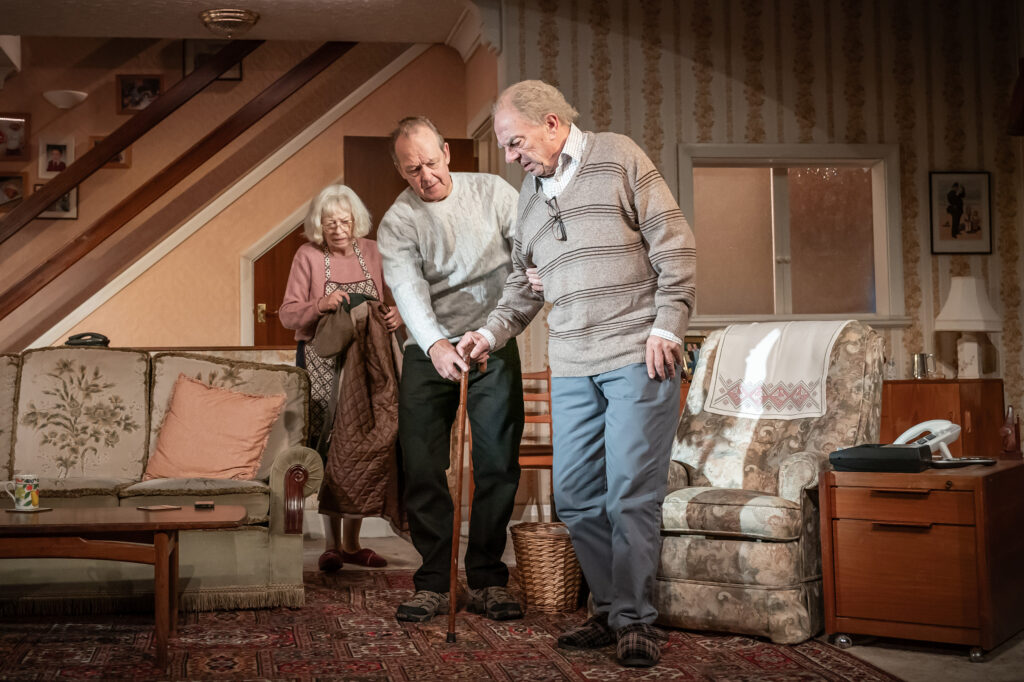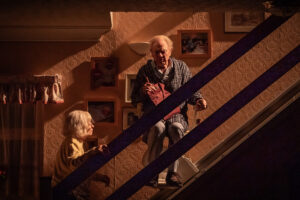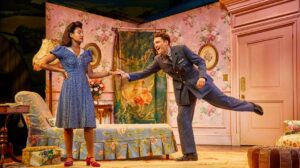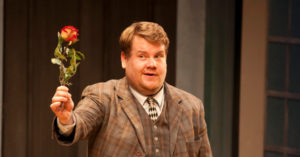Alun Armstrong stands out in new comedy

Richard Bean, writer of the incomparable One Man Two Guv’nors, has turned his attention to the challenges of old age in his new comedy To Have And To Hold. The focus is on the schism between working class parents and their educated middle class children. Something many of us have felt.
Yet despite the common experience and the pedigree of the writer, it lacks emotional impact. What it does offer are a lot of laughs and a superior comedy double act from Alun Armstrong and Marion Bailey.
Many of us baby boomers will be familiar with the situation To Have And To Hold describes. We were the first working class generation to go to university in large numbers, to aspire to middle class professions, and to leave our roots. Before finding ourselves with elderly parents in need of support.
I’m not saying younger generations won’t appreciate this play but I suspect it does not have the universality of some dramas about generational conflict.
Jack and Florence are on their last legs, literally in that they need a Stannah stairlift. This provides the first of many laughs, when Flo slowly descends to answer the front door. At the front door is their son Rob, who has come to try and sort out getting them into better accommodation. He is later joined by his sister Tina who has a particular interest in their health.
James Cotterill has designed a beautifully naturalistic living room that positively screams of old people who have lived there forever and haven’t changed anything in at least thirty years. The homely set also suggests, correctly, that we are nearer to the cosiness of a TV sitcom than the bleakness and remembrance of, say, Barney Norris’s Visitors, which covers similar ground.
Flo is getting by physically but she is showing signs of dementia. There is a running gag about her locking the front door and forgetting that she has the key in her apron. Jack is very ill but his brain is still sharp, so he can entertainingly recite lists of the names of pop stars and make barbed comments about being tied to Flo for seventy years.
And they bicker. They have a hilarious argument when she refers to the prostate as the prostrate and is unable to distinguish between the words. On another occasion, a convoluted question-and-answer bounces around like a pinball while which he tries to identify the name of a film director she can’t recall .
Flo has not yet lost the ability to launch some arrows of her own. When it is revealed that he has considered suicide and Switzerland is mentioned, she says she told him to go: ‘It’ll do you good. Broaden your horizons…you’ve never been abroad’. But there are many hints they are much closer than these exchanges would imply.
A comedy double act
Alun Armstrong and Marion Bailey are still in their seventies but are totally convincing as an elderly couple. Without them, the production would falter, because they are required to generate most of the laughs, and their timing is immaculate.
Christopher Fulford as Rob and Hermione Gulliford as Tina are fine actors but there is much less for them to get their teeth into. He is a successful crime writer, she an entrepreneur. Both are geographically and culturally a long way from Yorkshire and their parents. Their care seems more practical than emotional, their primary consideration seeming to be the price of everything.

Jack recognises this and responds with a permanent scowl and his best grumpy Northerner mode- words like cantankerous and curmudgeonly spring to mind. It is significant that he is happy to tell stories of his time as a police officer but won’t let his son record them, because he suspects Rob only wants fodder for his novels. This also suggests that old people have lives worth remembering if only the next generation took the trouble to listen.
A neighbour Eddie and a cousin Pamela, nicely played by Adrian Hood and Rachel Dale, appear to offer more genuine support in a digital age that has passed Jack and Nancy by. They help with shopping from a supermarket that is more than a walk away, with banking that is only available online, and with health problems now that doctors don’t do home visits.
This leads to resentment and suspicion from the children. And, if that isn’t enough, there’s a subplot to do with someone conning Jack and Nancy out of their money.
It’s all very familiar, I’m sure, for many people of my generation. I myself know about living a life totally foreign to my parents. I have first hand experience of how difficult it is to care for parents when they are 200 miles away. I have seen my elderly father scammed out of thousands of pounds. I know how my mother-in-law’s doctor won’t do a home visit, even though she’s over 90.
So, I felt a lot of sympathy with all the main characters, but I never felt empathy, no real emotional involvement. This production is jointly directed by Richard Wilson and Terry Johnson. You couldn’t get two better people to extract the best out of a comedy. And it is a lot of fun, but Richard Bean never digs deep enough into the main characters’ feelings to bring out the pathos of a situation that so many people like Jack and Flo find themselves in.
To Have And To Hold is at Hampstead Theatre until 25 November 2023.
Paul was given a review ticket by the theatre.
Click here to watch this review on the YouTube channel Theatre Reviews With Paul Seven



